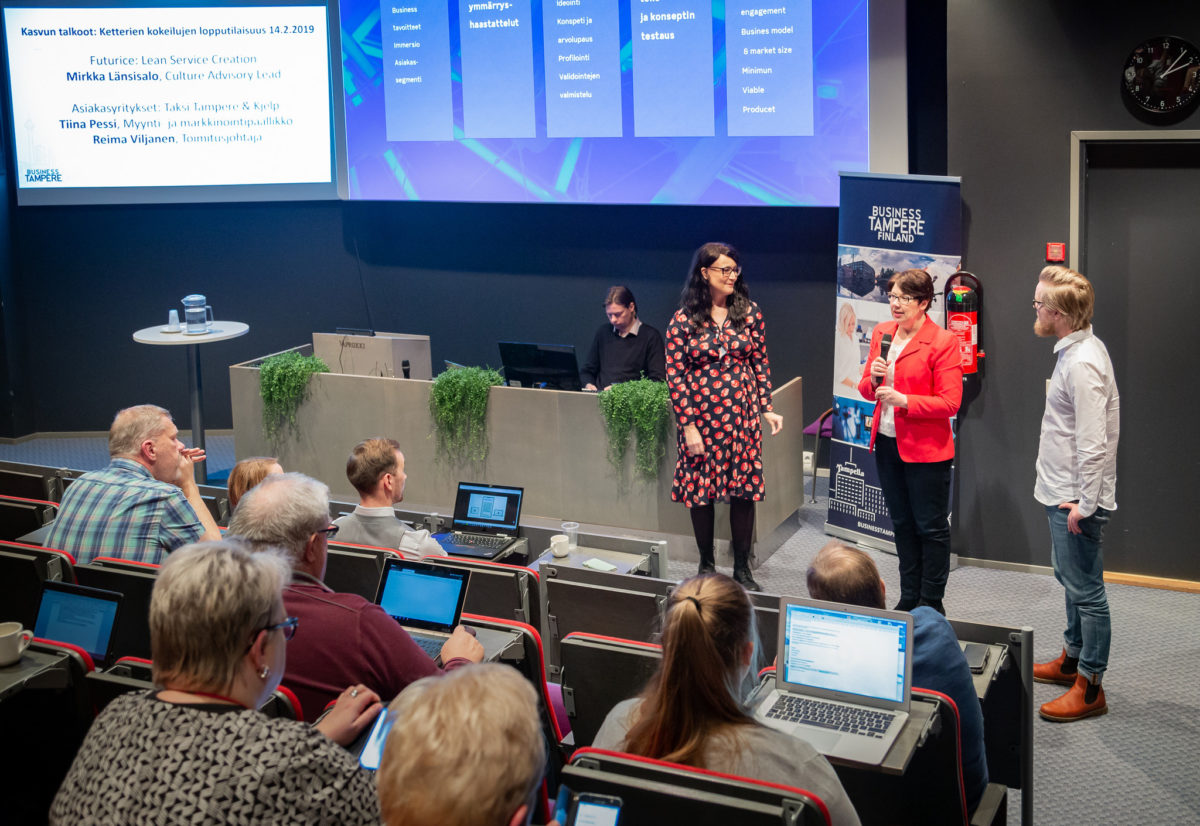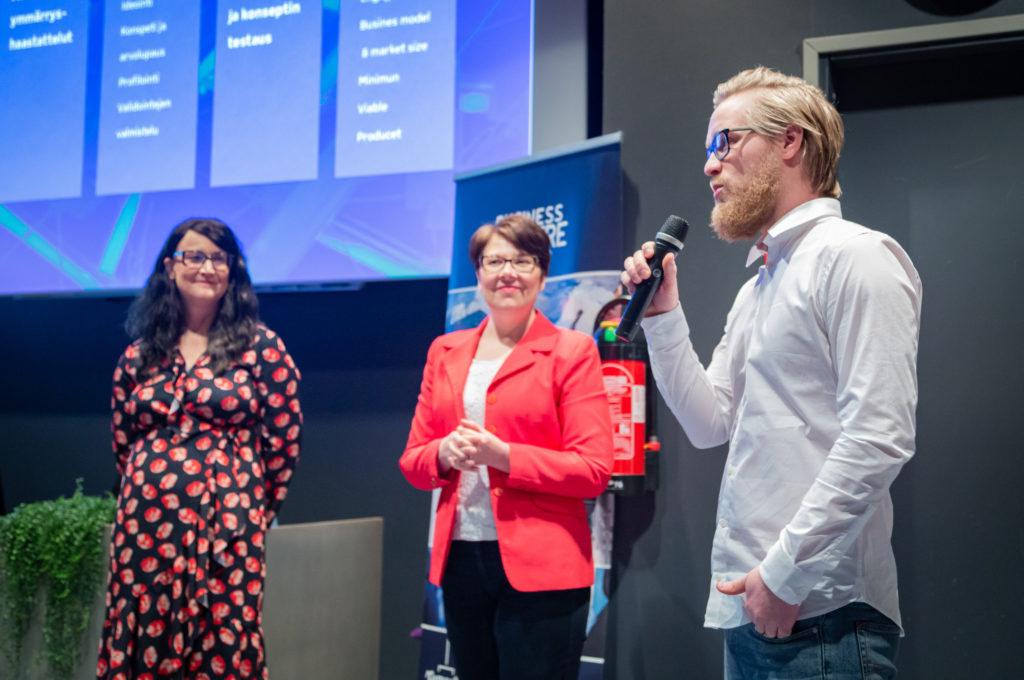Collaboration to Growth: Right questions at the right time
1.4.2019
Collaboration to Growth: Two very different companies tested the Futurice Lean Service Creation methodology. Sales and Marketing Manager Tiina Pessi of Tampereen Aluetaksi and CEO Reima Viljanen of Kjelp will share their views along with Futurice’s Culture Advisory Lead Mirkka Länsisalo and Senior Service Designer Jaana Olsson.
1: Why did you join the Startup Tampere agile experiments?
Futurice is a digital innovation and engineering consultancy with Finnish roots and over 500 experts in its offices across Europe. Futurice has been using and developing Lean Service Creation (LSC) with its customers for years, and is teaching it in universities for the future experts.
What’s interesting for us in Collaboration to Growth, is to be able to work with startups. We don’t do that too often. It is always fascinating to see how LSC works in different organisations, says Jaana Olsson.
– Startups have the speed and sparkle. So do the more established companies, of course, but the ability to make quick and agile decision defines startups, says Mirkka Länsisalo.
Kjelp is a Tampere-based startup with a modern marketplace for household maintenance services. Kjelp connects residents and local companies, and makes buying services easy.
– The agile experiment allowed us to prepare for the forthcoming development of our marketplace. We wanted to try LSC out, and use it to see whether our ideas were on the right track, Reima Viljanen explains.
Tampereen Aluetaksi is a taxi service company founded in 1990. It has about 500 taxis and provides more than 2 million taxi orders annually. When offered an opportunity to join the agile experiments, they made the effort to find the time and test something new. The theme to be worked on by LSC was relatively easy to decide.
– We launched a mobile app for consumers last year. Now we are working on a business edition and wanted to test LSC in that process, says Tiina Pessi.

2: What happened in your experiment?
Both companies adopted LSC tools and actions in a tight schedule: three workshops and in between them customer interviews and concept testing.
– The main idea is to ask the right questions at the right time, Länsisalo summarizes.
3: Results and things learned from the experiment?
Meeting the customers and listening to them is important – this became clearly evident in the experiment. LSC guides the work and makes sure the customers are contacted in early phases.
– It is not rare for a company to believe it’s already aware of what its customers want. Finish the product and ask questions later is surprisingly often the preferred order, Olsson says.
Tiina Pessi called Aluetaksi customers during the experiment, asked her questions and was received well. Customers were pleased that they were heard, and that something new was under development.
Reima Viljanen went to a café, located some promising interviewees, offered coffees and got his answers. Another set of interviews was made at Asta Constructor Fair where Kjelp target markets were readily available.
The experiment yielded results for both companies. Kjelp was convinced that it is heading for the right direction, Aluetaksi finished a suitable package for further processing. Both learned a lot about LSC and are willing to use it again.
Kjelp does already have their own way of workshopping: the team goes to a summer cottage, cooks together and discusses a chosen theme. There is usually plenty of talk and post-it notes to last an entire weekend.
– Our core team consists of four very talkative persons, and we tend to drift. LSC was a great method to focus the view so that a minimum viable product will get created, Viljanen says.
4: Your best advice to share?
”Ask the customer” is the most important one, as described above. In this respect questioning one’s chosen way is strongly encouraged.
– Even when everyone is excited and knows there is something unique at hand, it is always useful to challenge oneself and one’s ideas, Länsisalo says.
It is so easy to fall in love with one’s own ideas. If you are not able to question them yourself, then ask someone else to do it. LSC, for example, is a very good acid test, Viljanen states.
Trust the power of teamwork. Tampereen Aluetaksi brought people from all levels of their organisation into the experiment team – and when you are working on a common theme, levels should be left behind.
Everyone on the same line, from CEO to employees! Some people may find it hard to express themselves, but LSC helps everyone communicate their views, Pessi explains.
For a more innovative frame of mind, do get out of the office! Especially if you normally spend there most of your work days.
Tools to take ideas into a next level as part of business development
Futurice Lean Service Creation (LSC) is a systematic and adjustable way to create new services. It consists of a set of canvases that outline the relevant phases in a service creation process. LSC encourages co-creation, experimenting, learning and problem solving.
Lean Service Creation is an open source process, the tools and canvases are freely accessible to everyone. Facilitation is recommended, if you are new to LSC. For further information, please contact Mirkka Länsisalo of Futurice.
Updates from businesses: What’s up?
Times have been interesting in the taxi business after the entry into force of the Act on Transport Services in July 2018. According to Pessi, there have been no drastic changes in the Tampere Region so far. It remains to be seen whether, for example, any major new players enter the local market. The best way to react to any change is improving operations, products and services.
– We will keep listening to our customers. The demand for mobile services is on the rise, and we need to keep up with that, Pessi says.
But is it possible to choose and buy electrian’s or chimney sweeper’s services via your mobile? Probably not, and that’s why Kjelp is working on the shared marketplace. Residents use it to compare and buy services, and for service providing companies it is an easy and risk-free step to digitalisation.
– We’ll offer those companies a tool that gives them network visibility and a channel for invoicing. It makes sense to create one shared markeplace instead of an own app for everyone, Viljanen says.
Futurice is envisioning the fast shifting environment in Future Forces 2019 report. It highlights technology trends that are changing the world, peoples’ lives and work while creating new business opportunities. You can download the report here.
Agile experimenting is part of 6Aika: Ecosystems of Growth -project
Agile experimenting is part of 6Aika: Ecosystems of Growth -project. The project aims to generate new business activities in city regions and support growth oriented companies to better access networks and innovation ecosystems that support their needs. Project is a joint effort by the six largest cities in Finland: Helsinki, Espoo, Tampere, Vantaa, Turku and Oulu, together with the Council of Tampere Region. The idea of cities having a significant role in developing and activating networks to support innovation in companies, guides project implementation.
